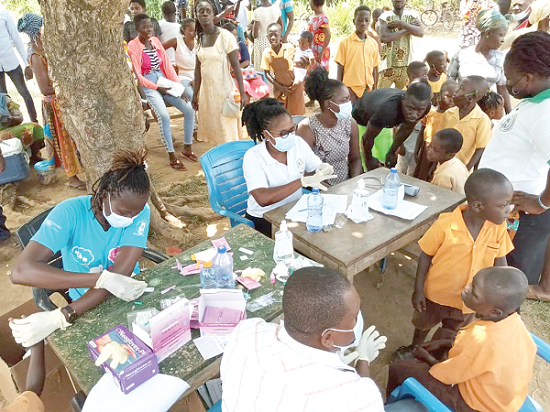
Mosquitoes develop resistance to insecticides — GAEC
Research conducted by the Biotechnology and Nuclear Research Institute (BNARI) of the Ghana Atomic Energy Commission (GAEC) has revealed extreme resistance to insecticides among Anopheles mosquitoes in a small cocoa-growing village in the Ashanti Region.
The research conducted at Atatam in the Adansi Asokwa District showed that there were two major malaria vectors, one dominating during the dry season and the other during the rainy season.
Advertisement
In many communities, there is only one transmission season, usually the rainy season.
The Director of the BNARI, Dr Michael Osae, made this known when he shared the findings with the chiefs and the people of Atatam as part of a malaria awareness campaign.
"Our research found out that there are two main types of malaria-causing mosquitoes in the Atatam community — the Anopheles gambiae and the Anopheles funestus. Both species have high resistance to all classes of insecticides — organophosphates, organochlorines, pyrethroids and carbamates — recommended by the World Health Organisation (WHO) for public health use,” he added.
Dr Osae indicated that the ‘super’ resistance to insecticides might be due to the use of pesticides by the people of Atatam on their cocoa farms, saying that the research showed that Atatam was a malaria-endemic community, with a heavy infestation of mosquitoes all-year round.
Context
The study was initiated as part of efforts to study the impact of insecticide resistance on malaria vector control.
Findings from earlier research, which showed ‘super’ resistance to insecticides and the year-round presence and transmission, informed the choice to run the malaria awareness campaign at Atatam.
Atatam has a population of about 500, with about 100 to 150 houses.
The study collected mosquitoes from about 30 to 40 rooms. It did not sample humans in the study, but screened 125 individuals during the malaria awareness campaign.
Other findings
“There are other such findings in the Obuasi municipality and other communities where we have worked, such as Dinkyeaye and Agyenkwaso in the Adansi Asokwa District, Okyereko and Adawukwa in the Gomoa East District and Osorongma, near Dodowa.
“In all those places, high levels of insecticide resistance were recorded,” Dr Osae said in an interview with the Daily Graphic.
Alternative tools
According to him, research was ongoing to proffer alternative tools that could fight the malaria vectors or prevent further resistance to maintain the effectiveness of existing vector control interventions.
He thanked partners and sponsors, as well as the chiefs and the people of Atatam, for supporting the institute's research activities and the malaria awareness campaign.
Next after study
Dr Osae said the ultimate was to use Atatam as a study site to establish the effectiveness of existing tools against insecticide resistant mosquitoes and the efficacy of new tools, so that they could be recommended for widespread use.
He explained that because of the unique situation at Atatam, the GAEC had secured funding to build experimental huts in the community for evaluating existing and new vector control strategies to determine which ones worked well for ‘super’ resistant mosquitoes.
Going forward
Dr Osae told the Daily Graphic that the BNARI was researching into novel malaria vector management strategies, such as the use of fungi and bacteria to control adults and larvae, respectively.
He made mention of GAEC’s flagship technology, known as ‘Sterile Insect Technique’, by which adult males were reared en mass, after which they were sterilised and released to mate with the wild females.
“Any female mated by a sterile male cannot produce any offspring,” he explained.
Malaria prevalence
The Adansi Asokwa District Director of Health, Mr David Kunta, gave some lessons on the behaviour of mosquitoes and the dangers they posed to people, adding that malaria cases were rising in the district.
Malaria topped all hospital cases by 32.5 per cent in 2020, he said, adding: "Malaria cases for the first quarter of 2021 also stand at 34 per cent as we speak.”
He, therefore, urged the people to continue to use insecticide-treated mosquito nets and report immediately at the clinic for health care whenever they felt unwell.
United effort
The Social and Behavioural Change Manager of AngloGold Ashanti Malaria Control Limited (AGAMaL), Mrs Alberta Gordon Bosomtwe, who represented the Programme Director, called for a united effort and the active involvement of everybody to bring the disease under control.
"The disease, if not brought under control, can affect the school performance of pupils, reduce productivity at workplaces through absenteeism, as work hours are lost, among others," she noted.
The Coordinator for the School Health Education Programme (SHEP) of the Ghana Education Service (GES), Mr Columbus Ewusie, said the district was always ready to support such programmes that targeted the health and wellness of pupils.
Campaign
The campaign, dubbed: ‘Zero Malaria – Draw the line against malaria’, was organised by the BNARI, in collaboration with the Ghana Health Service (GHS), the GES and the AGAMaL, to commemorate this year's World Malaria Day.



